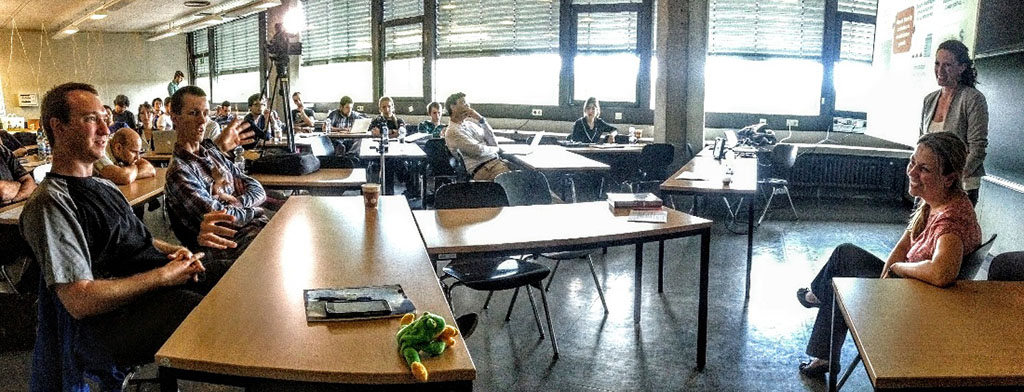 JFDI and Medical Innovations Incubator GmbH (MII) today announced a collaboration to adapt the accelerator insights and management processes developed by JFDI in Singapore to MII’s new MedTech programs in Tübingen, Germany. The aim is to short-cut the learning curve for MII’s team as they set up startup bootcamps and an accelerator which are the first of their kind in Germany.
JFDI and Medical Innovations Incubator GmbH (MII) today announced a collaboration to adapt the accelerator insights and management processes developed by JFDI in Singapore to MII’s new MedTech programs in Tübingen, Germany. The aim is to short-cut the learning curve for MII’s team as they set up startup bootcamps and an accelerator which are the first of their kind in Germany.
MII links directly to the teaching hospitals and renowned medical research centres of Eberhard Karls University, Tübingen, one of Germany’s oldest and most prestigious academic institutions. MII aims to connect researchers in fields such as brain science with market opportunities, using the new ‘science of startups’. MII staff will operate the ‘front end’ of the activities, teaching techniques like Design Thinking and Lean Startup Methodology. Meanwhile, JFDI will provide the ‘back end’ of tried-and-tested curriculum resources and systems for managing recruitment, evaluation, tracking, governance, fundraising and mentors.
MII was set-up by the non-profit Medical Innovations Foundation as a vehicle to help doctors and scientists develop their translational research into real-world products. MII is a “Company Builder”. Its purpose is to facilitate the disruptive innovations that healthcare must undergo, through the creation of low-cost enabling technologies, the development of innovative lean business models, and the emergence of new value networks. MII does this by bringing together researchers, academics and entrepreneurs; not to talk about the future, but to work together to create the technologies and businesses that will make up the future.
Dr. Lukas Radwan, of the university technology transfer office: “MII focuses on disruptive innovations that the world’s healthcare systems need to start taking advantage of low-cost enabling technologies, novel business models and new value networks. Our partnership with JFDI means our staff can focus on learning how to bring researchers, academics and entrepreneurs together to create the future. They don’t need to reinvent and replicate everything JFDI has already done to make working with large numbers of startups scalable.”
Beyond systems and process, JFDI will also provide a direct link to Singapore’s ‘Smart Nation’ innovation ecosystem and commercial opportunities for MII’s healthcare products and services targeted at the rising middle class all across Asia.
Speaking as a mentor at MII’s Startup MedTech Boot Camp, which was held last week at Rossberg Tower, a mountaineering retreat near Tübingen,JFDI.Asia co-founder Meng Wong said: “Singapore has traditionally been seen as the stable hub and gateway into the SE Asia region. That’s still true but the holistic, systematic approach being adopted under Singapore’s Smart Nation agenda also aligns closely with the culture of engineering in Germany. There is strong potential to collaborate to create innovations that will improve lives from East to West. We very much hope that startups incubated at MII will come to explore the potential of Asia through JFDI’s structured Go Global Programs.”

One of the first medical innovation projects to benefit from MII’s programs in Germany is the Acute Stroke App, a project led by Daniel Heblik and Dr. Sven Poli (deputy director of the vascular Neurology department), that helps the stroke doctors find therapeutic options through clinical stroke trials that give patients outside of the regular treatment window potential treatment options.
Dr. Poli says about the program: “We work every day for the benefit of our patients, and every day we see things where healthcare could be and should be better. We have ideas and we know what needs to be done, but we need the help from engineers and business people to execute and build solutions for these needs that we’ve identified. The doctors at the university hospital don’t have time, but we will find the time for them to be with the teams that build those solutions because they are helping us solve the problems we deal with every day.”
MII CEO, Dr Christoph Zrenner, is a medical doctor and serial entrepreneur whose most recent venture Wildfire is a social marketing company that organizes word-of-mouth into a scalable and efficient media channel for brands in China and the Asia-Pacific region. As it builds social capital to connect different disciplines, MII’s MedTech community is already benefitting from the insights that Dr Zrenner gained through Wildfire. Dr Zrenner was one of the earliest investors in JFDI’s Singapore accelerator programs.
JFDI CEO Hugh Mason said: “There are now thousands of entrepreneur support programs being set up worldwide. But scaling up an innovation factory that creates products fit for a demanding, regulated environment like MedTech, where lives are at stake, needs consistent processes. We are delighted to be working with MII. This is the first in a series of international collaborations that we hope will lead us to replicate the success of Singapore’s famous ‘Kumon Maths’ program. Based on our success in our home market, we want to offer the world a system for schooling startups that works across cultures, verticals and locations, time after time.”

